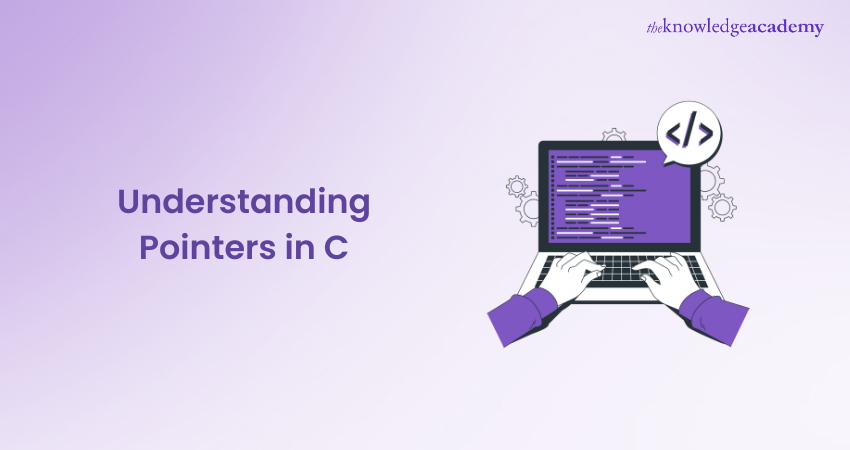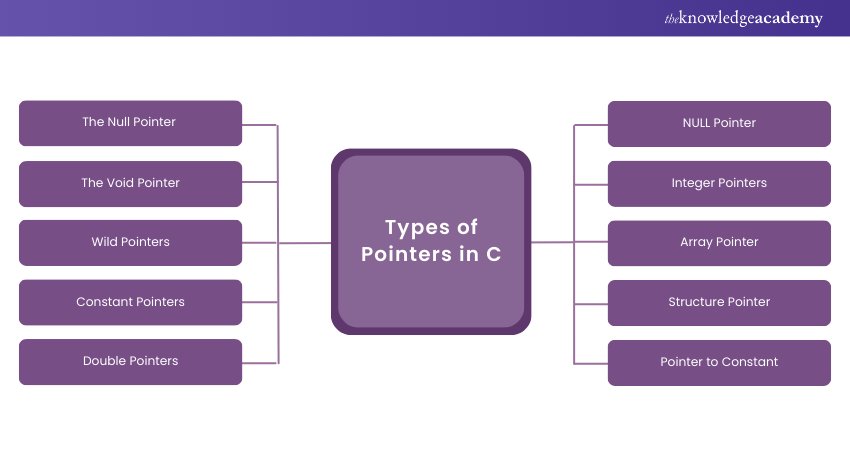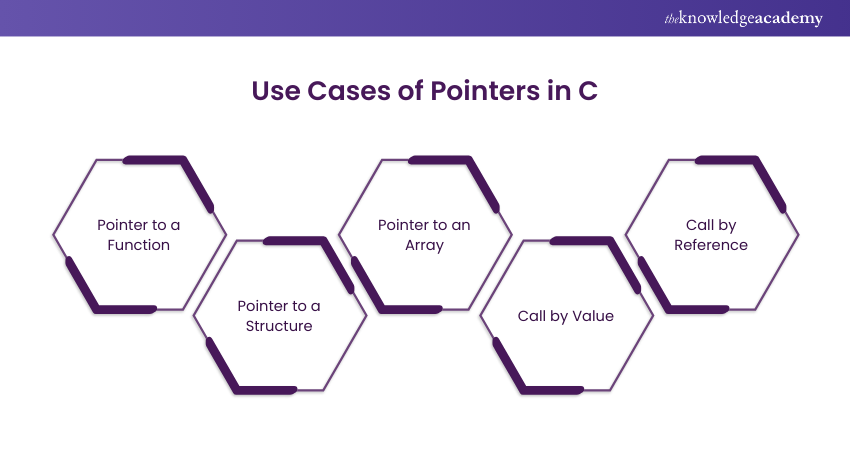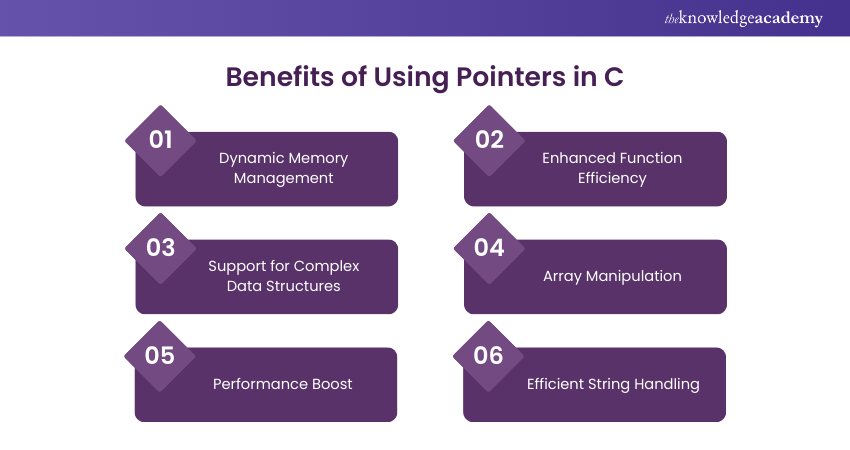We may not have the course you’re looking for. If you enquire or give us a call on + 800 908601 and speak to our training experts, we may still be able to help with your training requirements.
Training Outcomes Within Your Budget!
We ensure quality, budget-alignment, and timely delivery by our expert instructors.

Are you grappling with those pesky runtime errors in C? Wondering if pointers might be the key to solving them? Well, you’re in luck because they just might be! This blog is here to clear up any confusion you might have. If you’re already familiar with C and pointers, you’re in for a treat. Pointers can make your coding experience smoother, more efficient, and highly productive. In this post, we’ll dive into what Pointers in C are, explore their different types and use cases, and weigh their many benefits and potential drawbacks.
Table of Contents
1) What is a ‘Pointer in C’?
2) Types of Pointers in C
3) Use Cases of Pointers in C
4) Understand Pointer Sizes in C
5) Benefits of Using Pointers in C
6) Drawbacks of Using Pointers in C
7) Conclusion
What is a ‘Pointer in C’?
A Pointer in C is a variable in the C+ language designed to store the addresses of other variables. Unlike other variables, it does not participate directly in coding; rather, it serves as an index for developers to access where they have stored their variables.
Let’s take an example to understand it better. Consider a pointer that is storing the address of an integer variable in C:
|
int x = 10; int *ptr = &x; |
Here, ‘x’ holds the value 10, while ptr holds the address of the memory of ‘x.’ You can access or modify x's value using *ptr, making pointers essential for tasks like dynamic memory allocation, efficient array handling, and creating complex data structures, including linked lists.
Types of Pointers in C
Pointers play a crucial role in C Programming by allowing direct memory access and manipulation to make coding even more efficient. Each pointer type has a specific function and use case that enhances the program's capability and flexibility. Here are the types of Pointers in C that you must know:

1) The Null Pointer
A null pointer is a special pointer type explicitly assigned to NULL. It indicates that it points to no valid memory location, thus preventing unintended access.
2) The Void Pointer
A void pointer is a generic type of pointer that can store addresses of any data type. However, it must be cast to the appropriate type before dereferencing.
3) Wild Pointers
Wild pointers are uninitialised pointers that majorly point to arbitrary memory. This action causes unpredictable behaviour and potential crashes.
4) Constant Pointers
Constant pointers have a fixed memory address that cannot be changed once assigned. However, the value at the address can be modified.
5) Double Pointers
Double pointers are a crucial type of pointer that stores the address of another pointer, thus enabling multiple levels of indirection.
6) NULL Pointer
The NULL pointer is explicitly set to NULL. It functions to ensure that it does not point to any memory while serving as a safe way to indicate an empty reference.
7) Integer Pointers
Integer pointers are specifically designed to store the addresses of integer variables, allowing the direct manipulation of integer values in memory.
8) Array Pointer
Array pointers are significant pointer types that point to the first element of an array. This action enables iteration over elements using pointer arithmetic.
9) Structure Pointer
Structure pointers work to store the addresses of structures. This approach allows efficient access to and modification of structure members.
10) Pointer to Constant
A ‘Pointer to a Constant’ corresponds to a value that cannot be changed through the pointer. As a result, it ensures data integrity during program execution.
Unleash C language concepts from the beginning with our C# Programming (C Sharp) Course- sign up today!
Use Cases of Pointers in C
Pointers in C offer versatility by enabling direct memory access, which is essential for efficient program execution. They are widely used in different scenarios to enhance functionality, such as passing variables, managing arrays, and handling dynamic memory. Below listed are some of the use cases of Pointers in C:

1) Pointer to a Function
Pointers to functions allow dynamic selection of functions during runtime. This approach is useful for implementing callback functions, event handling, and creating function arrays.
2) Pointer to a Structure
‘Pointers to Structure’ helps access and modify structure members efficiently, especially when dealing with large data structures. This reduces memory usage and improves performance.
3) Pointer to an Array
‘Pointers to Arrays’ are used for iterating over array elements, passing arrays to functions, and performing operations such as searching or sorting efficiently.
4) Call by Value
In ‘Call by Value’, pointers enable passing arguments by copying values, allowing the function to access the values but not modify the original variables.
5) Call by Reference
Pointers are crucial for ‘Call by Reference’, where they pass the actual memory address of variables to functions. This enables direct modification of the original data.
Understand Pointer Sizes in C
In C, the pointer size is determined by the system’s architecture, not the data type it points to. For instance, on a 32-bit system, a pointer typically occupies 4 bytes, whereas on a 64-bit system, it occupies 8 bytes. This size remains constant regardless of whether the pointer references an int, char, or float, but it varies with the system architecture.
Pointer size is important for memory allocation and data manipulation. Understanding pointer sizes assists in managing memory alignment, especially in low-level operations like system programming and hardware interfacing. This knowledge ensures efficient memory use and helps prevent errors such as buffer overflows and misaligned data access, which are vital for system stability.
Dive into advanced C Programming techniques with our C++ Programming (C Plus Plus) Course- start today!
Benefits of Using Pointers in C
Pointers in C provide programmers with more control over data handling, thus allowing for better performance and flexibility. Here are the benefits of using Pointers in C:

1) Dynamic Memory Management: Pointers allow for the allocation and deallocation of memory during runtime using functions like malloc() and free(). This makes memory usage more flexible and efficient.
2) Enhanced Function Efficiency: By enabling call by reference, pointers allow functions to directly modify variables. This improves performance, especially when passing large data structures, as only addresses are transferred rather than entire data blocks.
3) Support for Complex Data Structures: Pointers efficiently manage memory addresses, supporting the creation and manipulation of complex data structures, such as linked lists and trees.
4) Array Manipulation: Through pointer arithmetic, pointers facilitate easy iteration and data access within arrays. This enhances the power and versatility of C Programming.
5) Performance Boost: Pointers enable direct memory access, reducing processing time. This is particularly beneficial for operations requiring repetitive data handling, such as iterating through arrays or managing buffers in real-time applications.
6) Efficient String Handling: Pointers allow for efficient handling of strings and character arrays, making operations like string copying, concatenation, and searching faster and more manageable.
Drawbacks of Using ‘Pointers in C’
While pointers offer significant advantages in C Programming, they can also be challenging to manage. Improper use of pointers can introduce various errors and potential security risks in the code, making them tricky for beginners to handle. Here are the drawbacks of using Pointers in C:
1) Complexity: Understanding and using pointers correctly requires a good grasp of memory management. Beginners often struggle with concepts like pointer arithmetic, leading to critical errors during the latter stages.
2) Risk of Dangling Pointers: Dangling pointers occur when pointers continue to reference memory that has been freed. This can lead to unpredictable behaviour, crashes, or data corruption.
3) Wild Pointers: Uninitialised pointers, known as wild pointers, point to random memory locations. They pose serious risks to program stability and can cause erratic behaviour.
4) Security Vulnerabilities: Misusing pointers or mishandling memory boundaries can lead to buffer overflows. This may allow attackers to exploit the program, leading to security breaches.
5) Debugging Challenges: Debugging pointer-related errors can be time-consuming. Issues like memory leaks or segmentation faults are often difficult to trace, requiring careful implementation to minimise risks.
Get started with Embedded C concepts today- join our Introduction of Embedded C Programming Course today!
Conclusion
Pointers in C are powerful tools for efficient memory management, dynamic allocation, and handling complex data structures. However, they also come with their own sets of challenges. These include increased complexity and potential security risks. By mastering pointers, you can make your C Programming more robust. However, it is always advisable to use them with care to avoid common pitfalls.
Develop core Java concepts for Real-World Coding with Java Programming Training- sign up now!
Frequently Asked Questions

The main purpose of Pointers in C is to provide direct memory access, allowing efficient data manipulation and management. They enable dynamic memory allocation, facilitate call-by-reference in functions, and support complex data structures like linked lists and trees. Pointers enhance flexibility and optimise resource usage in programming.

The memory of a pointer is determined by the system architecture. On a 32-bit system, a pointer typically occupies 4 bytes, while on a 64-bit system, it uses 8 bytes. This memory size remains constant, regardless of the data type it points to, but varies with the system's bit configuration.

The Knowledge Academy takes global learning to new heights, offering over 30,000 online courses across 490+ locations in 220 countries. This expansive reach ensures accessibility and convenience for learners worldwide.
Alongside our diverse Online Course Catalogue, encompassing 19 major categories, we go the extra mile by providing a plethora of free educational Online Resources like News updates, Blogs, videos, webinars, and interview questions. Tailoring learning experiences further, professionals can maximise value with customisable Course Bundles of TKA.

The Knowledge Academy’s Knowledge Pass, a prepaid voucher, adds another layer of flexibility, allowing course bookings over a 12-month period. Join us on a journey where education knows no bounds.

The Knowledge Academy offers various C Programming Courses, including the Earned Value™ Management Foundation and Practitioner Course, and the Earned Value™ Management Foundation Course. These courses cater to different skill levels, providing comprehensive insights into Friend Function and Class in C++.
Our Programming & DevOps Blogs cover a range of topics related to software development and deployment, offering valuable resources, best practices, and industry insights. Whether you are a beginner or looking to advance your coding and DevOps skills, The Knowledge Academy's diverse courses and informative blogs have got you covered.
Upcoming Programming & DevOps Resources Batches & Dates
Date
 C Programming
C Programming
Thu 14th Nov 2024
Thu 16th Jan 2025
Thu 6th Mar 2025
Thu 22nd May 2025
Thu 24th Jul 2025
Thu 25th Sep 2025
Thu 20th Nov 2025
Thu 11th Dec 2025







 Top Rated Course
Top Rated Course



 If you wish to make any changes to your course, please
If you wish to make any changes to your course, please


